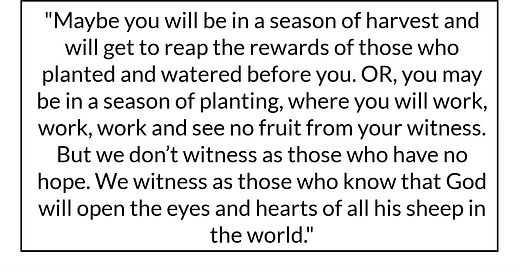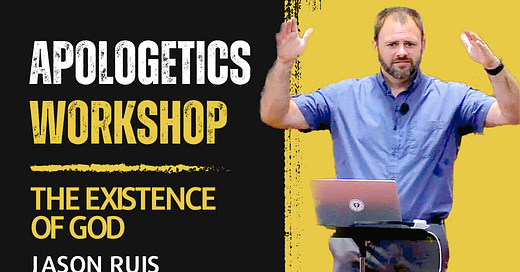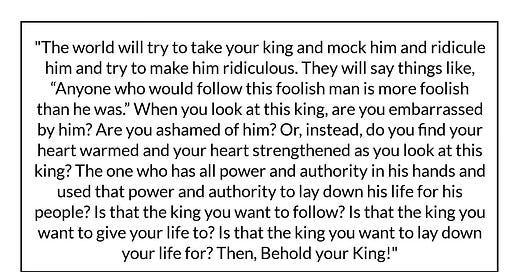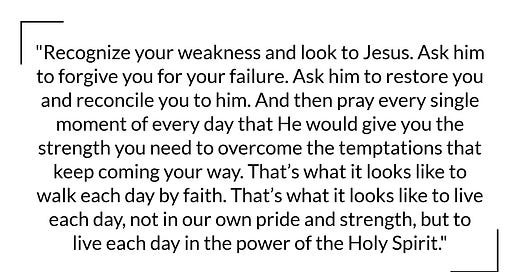
Many Came and Believed
[Read John 10:40-42]
This week I was reminded of a story I read quite a while ago about a missionary named Dr. William Leslie. He was pursuing a degree in pharmacy when he turned to Jesus Christ, believed, and became a Christian in 1888 (almost 140 years ago). Eventually God laid a missionary calling on his heart. So, he used his profession to enter into medical missions. We served in various places before he landed in the Democratic Republic of the Congo, where he served for 17 years. Eventually, tensions arose between him and some of the tribal leaders and they kicked him out of the city and asked him never to return again. He left feeling completely discouraged, like he hadn’t made an impact for Christ in the city. I’m sure he also wondered why God had called him to that city and wondered if he had just wasted seventeen years of his life. He died nine years after leaving the Congo. Stories like that always raise a particular question: Was his ministry a failure?
We all find ourselves asking similar questions of our own lives. I’ve mentioned how a primary theme of the Gospel of John is about witness. As we’ve walked our way through the Gospel, we’ve been increasingly encouraged/challenged to be faithful witnesses in the world—pointing people to Jesus Christ, telling them who he is and what he has done. Yet, that’s easier said than done AND it’s hard to keep going when it seems like you’re beating your head against the wall, constantly running into hard heart after hard heart.
I think it should give us some level of consolation to see that Jesus was often received in a similar way. We’ve seen that for the past three or four chapters. The constant theme for the past few chapters is Jesus explaining who he is and why he came, people refusing to believe, and then trying to kill him. We’ve heard Jesus repeatedly point out what it looks like to be a true disciple and a faithful follower. Yet, he hasn’t gotten much traction. It has often felt like he has been beating his head against their hard-hearts to no avail.
Then we read this: “He went away again across the Jordan to the place where John had been baptizing at first, and there he remained.” (John 10:40, ESV). Now, at first glance it may seem like Jesus is just running away from the conflict—and to some degree he is, because it is not yet his time. However, there’s more going on here. John is setting up a stark contrast between what we’ve been reading for the past few weeks and what we’re about to see. For the past few weeks, Jesus has been in Jerusalem and often at the temple. He was at the center of Jewish life and society, and he was rejected. We’re reminded of the beginning of the gospel where John says, “He came to his own, and his own people did not receive him.” (John 1:11, ESV). That’s what we’ve been seeing for the past few chapters.
So, Jesus leaves Jerusalem and heads across the Jordan to where John was initially baptizing. It’s significant that Jesus heads across the Jordan, which is outside the Promised Land. Now, most likely, he’s still with Israel because two of the tribes chose to remain outside the Promised Land, but John is telling us that Jesus is heading away from the center of Jewish life to the wilderness where John the Baptist began his ministry.
Now, there are some who overplay this a little bit, and overemphasize how Jesus ministered on the margins and to the marginalized. Obviously, that’s true. Yet, as we’ve just seen for the past few chapters, that’s not the only place Jesus ministered. He also ministered in the center, in the places of power and influence. So, I want to make sure we don’t overplay what we’re about to see in this passage. Really, John is giving us a stark picture of what he told us in the beginning. His own people did not receive him. So, he left and went into the wilderness.
And we read: “And many came to him.” (John 10:41, ESV). Now, because John likes to write this way, I think John is giving us a contrasting image to our previous story. In the previous story, as Jesus walked around the temple, the Jewish leaders “came to him” to surround him and trap him. Now, we’re seeing something very different in the desert. Many are coming to him—surrounding him—but they are coming to see and hear him. They are attracted to him.
I want to pause a second and make sure we don’t miss that point. They were attracted to Jesus, that’s why many people came to him when he was in the desert. Not everyone was attracted to Jesus—as we’ve just seen. Some hate Jesus and want to kill him. However, many people were attracted enough to Jesus that they followed him out into the desert. I’m making this point because we all face this temptation of trying to make Jesus attractive to people. We think we need to become marketing agents for Jesus—PR reps for Jesus. We think we need to give him a new image and hype him up a bit so that people will be attracted to him—and in doing these things we often turn Jesus into someone he isn’t. Yet, this picture is showing us that Jesus—in and of himself—was very attractive to some people. It’s not our job to hype him up and market him to the world. We need to remember that some will see Jesus, hate him, and reject him, but others will see Jesus, love him, and believe in him. It’s our job to be faithful witnesses—faithfully pointing people to Jesus (who he is and what he has done).
This is what John the Baptist did. We were already told that this is “…the place where John had been baptizing at first…” (John 10:40, ESV). So, we’re reminded that John had been faithfully witnessing in this place for a while. Now, some time later, we hear the people say, “John did no sign, but everything that John said about this man was true.” (John 10:41, ESV). I love that line. It’s one of those backhanded compliments that people hand out—kinda like saying, “You’re not as dumb as you look.” It’s like they’re saying, “You know, John wasn’t very flashy. He didn’t do anything special or spectacular. He didn’t do any signs. But what he said about this guy was true.” It wasn’t pretty or flashy or showy. It was true. That was John’s witness.
Let’s go back to the beginning of the Gospel of John for a moment and look at exactly what John said about Jesus—the things that these people now know to be true. We read this, “I baptize with water, but among you stands one you do not know, even he who comes after me, the strap of whose sandal I am not worthy to untie.” (John 1:26–27, ESV). John was constantly telling these people that he was nothing and that Christ was great. John wasn’t even worthy to untie his sandal. That’s the pointing away from himself to Jesus that I’ve been talking about. Later John would reiterate this when he says, “He must increase, but I must decrease.” (John 3:30, ESV).
Eventually, John explains this further by helping them to see why Jesus is so much greater than he is. He says, “Behold, the Lamb of God, who takes away the sin of the world!” (John 1:29, ESV) and later he says, “Behold, the Lamb of God!” (John 1:36, ESV). John has been telling these people that Jesus is the Lamb of God—a lamb different than all of the other lambs sacrificed throughout history. He is THE lamb of God who takes away the sin of the world. That’s why Jesus is so much greater than John. That’s why John isn’t worthy to untie Jesus’ sandals. That’s why Jesus must become greater and John must decrease. He is the Lamb of God who takes away the sin of the world.
We also hear this, “And John bore witness: “I saw the Spirit descend from heaven like a dove, and it remained on him. I myself did not know him, but he who sent me to baptize with water said to me, ‘He on whom you see the Spirit descend and remain, this is he who baptizes with the Holy Spirit.’ And I have seen and have borne witness that this is the Son of God.”” (John 1:32–34, ESV). John told these people—he bore witness—that Jesus is the Son of God because he saw the Holy Spirit descend on him like a dove. God had told him that whoever this happens to is the Son of God. John saw it happen, so he knows this about Jesus, and he tells people about it. He bears witness to who Jesus is and what he has done/will do.
John also says this, which sets up this passage nicely. When they keep asking who he is, John says, “I am the voice of one crying out in the wilderness, ‘Make straight the way of the Lord,’ as the prophet Isaiah said.” (John 1:23, ESV). Now, this has a double effect, doesn’t it? John is explaining what he is doing AND who he is doing it for. He is making a way for the Lord in the wilderness. So, he is pointing people to the fact that Jesus is the Lord. However, he is also pointing to his role in this. He’s telling them that his job is to “make straight the way.” His job is to pave the path. His job is to plant the seed.
Now we see John’s paving and planting coming to fruition. We read this, “…’everything that John said about this man was true.’ And many believed in him there.” (John 10:41–42, ESV). John’s faithful witness in the desert bore good fruit. It wasn’t flashy. It wasn’t showy. It wasn’t accompanied by powerful signs and wonders. It just faithfully pointed people to Jesus over and over and over again so that when they saw Jesus, they knew who he was and believed in him. And we have no idea how long of a gap there was between this witness of John and the fruit it bore. We just know that John accomplished his mission, didn’t he? He was given the task of making a clear path to Jesus the Lord, and now people were following the path and believing in Jesus.
And notice the repeated word in this passage: many. That’s intentional. John puts that many people came to Jesus and that many people believed in Jesus. John wants to make sure you don’t miss that fact. It’s not just a few people who believe in Jesus in the desert. No. Many people believed in Jesus because of John’s faithful witness and seeing Jesus clearly. This is the second part of what we read in the beginning of John’s Gospel: “He came to his own, and his own people did not receive him. But to all who did receive him, who believed in his name, he gave the right to become children of God, who were born, not of blood nor of the will of the flesh nor of the will of man, but of God.” (John 1:11–13, ESV). There are those who are going to reject him and refuse to receive him BUT there are others who will receive him and believe in his name. When they do that, they become children of God who have been born of God.
The difficult part in all of this is that we don’t always know who is who NOR do we always know whether our witness is effective or not. We can’t always tell whether we are in a season of planting or harvesting. To be honest, we often don’t even think in these categories, do we? I think we often expect to be in a season of harvest. We expect to be talking to people who are willing to believe in Jesus. Yet, maybe we’re not. We don’t know. Maybe we are, but we’re only planting seeds.
The story I told at the beginning is a good example of this. Dr. William Leslie served in that city for seventeen years, saw no fruit, then was kicked out of the city. About 130 years later, a group of missionaries heard about Dr. Leslie’s work in the Congo. They thought that it might be a place to start their missionary work because these people had, at least, heard about Jesus—seeds had been planted. So, they flew, hiked, and canoed into the city over one hundred years after Dr. Leslie’s missionary service. Here’s what they said, “When we got in there, we found a network of reproducing churches throughout the jungle. Each village had its own gospel choir, although they wouldn’t call it that. They wrote their own songs and would have sing-offs from village to village.” They found churches that were planting churches. They found churches that were healthier than many churches in the United States. They even found a “cathedral” in one of the villages that seated 1,000 people. When asked how this happened, the villagers pointed back to Dr. Leslie. He left there defeated and discouraged. He left there feeling like he hadn’t accomplished much, maybe like he’s wasted seventeen years of his life. Yet, 100 years later there are churches thriving, growing, expanding in those villages because of his work. He had been a faithful witness in that city—faithfully pointing away from himself to Jesus Christ—not knowing what exactly was happening, just trying to be faithful. He was planting seeds that God would eventually grow into something greater than he could have ever asked or imagined.
The Apostle Paul reminds of this truth: “I planted, Apollos watered, but God gave the growth. So neither he who plants nor he who waters is anything, but only God who gives the growth.” (1 Corinthians 3:6–7, ESV). We are nothing in this, really. God is the one who does the work and provides the growth. Our calling is to keep planting and watering in faith—trusting that God will bring about a harvest, even when we don’t see it, even when we may NEVER see the harvest. Our calling is to simply continue to faithfully point people to Jesus Christ—not knowing how or when or IF it will be used.
That reminds us that it’s all by faith, isn’t it? We look to Jesus Christ to be saved by grace through faith—that is true. We also carry out our witness by faith—trusting that He will use our witness in whatever way will bring him the most glory and continue to extend his kingdom. We do not need to see the results because faith is conviction of things unseen. By faith, we continue to point people to Jesus Christ as the Lamb of God who takes away the sin of the world, over and over and over again. By faith, we keep planting those seeds, trusting God to give the growth.
Who knows? Maybe you will be in a season of harvest and will get to reap the rewards of those who planted and watered before you. OR, you may be in a season of planting, where you will work, work, work and see no fruit from your witness. But we don’t witness as those who have no hope. We witness as those who know that God will open the eyes and hearts of all his sheep in the world. They will hear his voice and follow him and receive salvation. We may get to see that happen in our lifetime OR it may come over a hundred years after our lifetime. Doesn’t matter. Our job is to faithfully point people to Jesus wherever we are—whether in the temple or the desert—trusting him to use it for his kingdom and glory. That’s why we don’t lose heart. That’s why we keep on planting and watering and pointing people to Jesus Christ by faith.










